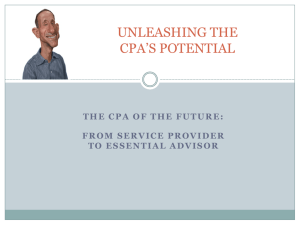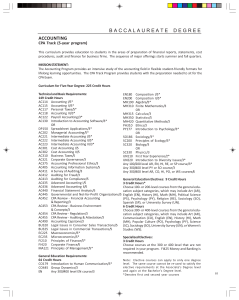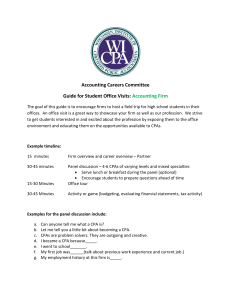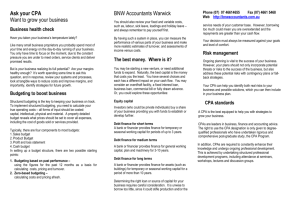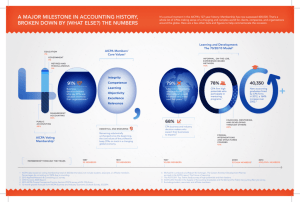Document
advertisement
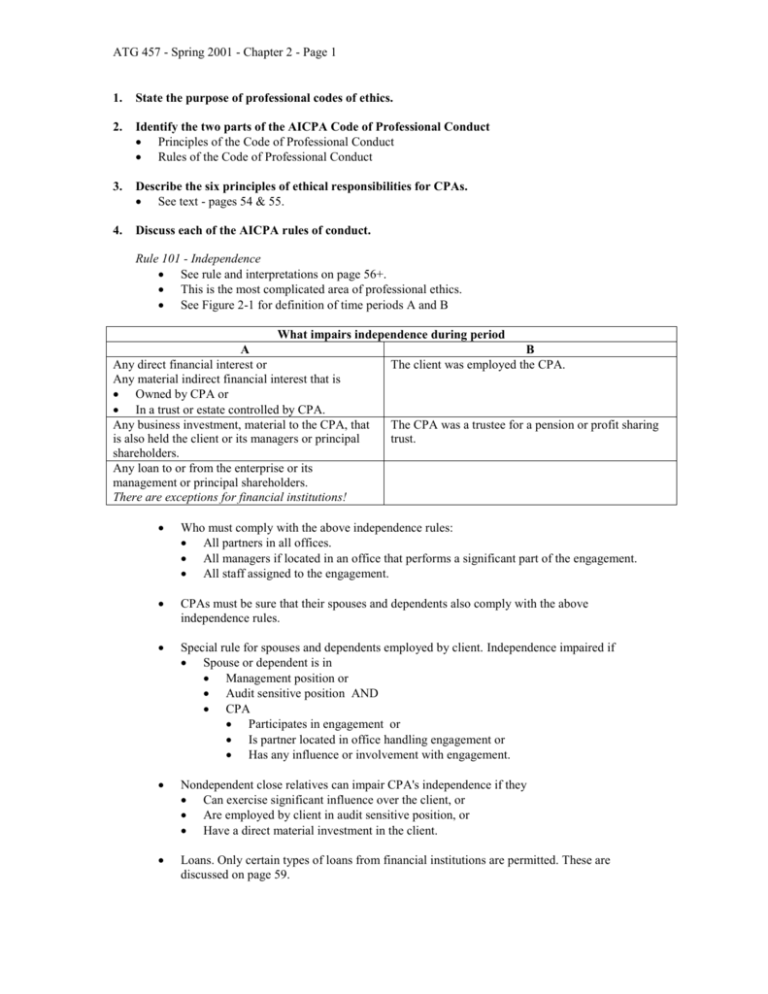
ATG 457 - Spring 2001 - Chapter 2 - Page 1 1. State the purpose of professional codes of ethics. 2. Identify the two parts of the AICPA Code of Professional Conduct Principles of the Code of Professional Conduct Rules of the Code of Professional Conduct 3. Describe the six principles of ethical responsibilities for CPAs. See text - pages 54 & 55. 4. Discuss each of the AICPA rules of conduct. Rule 101 - Independence See rule and interpretations on page 56+. This is the most complicated area of professional ethics. See Figure 2-1 for definition of time periods A and B What impairs independence during period A B Any direct financial interest or The client was employed the CPA. Any material indirect financial interest that is Owned by CPA or In a trust or estate controlled by CPA. Any business investment, material to the CPA, that The CPA was a trustee for a pension or profit sharing is also held the client or its managers or principal trust. shareholders. Any loan to or from the enterprise or its management or principal shareholders. There are exceptions for financial institutions! Who must comply with the above independence rules: All partners in all offices. All managers if located in an office that performs a significant part of the engagement. All staff assigned to the engagement. CPAs must be sure that their spouses and dependents also comply with the above independence rules. Special rule for spouses and dependents employed by client. Independence impaired if Spouse or dependent is in Management position or Audit sensitive position AND CPA Participates in engagement or Is partner located in office handling engagement or Has any influence or involvement with engagement. Nondependent close relatives can impair CPA's independence if they Can exercise significant influence over the client, or Are employed by client in audit sensitive position, or Have a direct material investment in the client. Loans. Only certain types of loans from financial institutions are permitted. These are discussed on page 59. ATG 457 - Spring 2001 - Chapter 2 - Page 2 Honorary directorships and trusteeships will not impair independence. If a client offers a CPA a job, The CPA must remove himself from the job while considering the offer. If a CPA considered a job and did not remove himself from the engagement, it may be necessary to re-perform some audit procedures. Accounting and bookkeeping services will not impair independence so long as: Client accepts responsibility for financial statements. CPA does not as employee or management. CPA complies with all audit, review, or compilation standards. Actual or threaten litigation will impair independence if Client alleges audit deficiencies by CPA. CPA alleges management fraud or deceit. Independence not impaired if litigation not related engagement and is immaterial to CPA or client. Table 2-4 lists more independence rulings. Finally, you are very fortunate. The AICPA makes the Code of Professional Conduct available through the Internet. Therefore, if you are ever in doubt about an issue, you can look it up at this site. Rule 102 - Integrity and Objectivity See rule on bottom of p. 61. Interpretations: 102-2: Avoid conflicts of interest 102-3: Do not misrepresent facts to external auditor. 102-4: Disputes on the audit. If accountant disagrees with superior: Do nothing if supervisor's proposes acceptable alternative. Consult with higher levels of management if accountant believes material misstatement will result. Document reasons for disagreement in work papers. Consider need to consult legal counsel, leave employer, or notify third parties. Rule 201 - General Standards See rule on Page 62. Essentially, it requires all accountants to comply with 4 standards Professional competence to complete engagement. Competence not required when engagement is accepted. Competence includes ability to supervise. Exercise due care. Perform proper planning and supervision. Gather sufficient relevant data to support conclusions and recommendations. Rule 202 - Compliance with Standards See rule on bottom of p. 63. When the accountant does a (an): Audit Compilation or Review Attestation Engagement Consulting Engagement The accountant must comply with: SASs SSARS SSAEs Management Consulting Services Standards ATG 457 - Spring 2001 - Chapter 2 - Page 3 Rule 203 - Accounting Principles See rule on page 64. If financial statements depart from GAAP, the CPA cannot state an opinion (or give negative assurance) that the statements comply with GAAP unless the CPA is convinced that following GAAP would be misleading and reports the existence and effects of this departure. Rule 301 - Confidential Client Information See rule page 64. Client information should be kept confidential In most state and federal courts, this information is not privileged. Circumstances when client information can be revealed: Make disclosure about departure from GAAP To comply with valid subpoena or summons. Permit a review of a CPA's practice by state society or AICPA. Respond to ethics board or disciplinary body. Permit prospective buyer to review the CPA's practice. Rule 302 - Contingent Fees See rule page 66. Contingent fees are OK provided that the CPA does not also perform a (an): Audit of financial statements Review of financial statements Compilation where third party will use financial statements and report does not disclose lack of independence. Examination of prospective financial statements. Also, tax returns or claims for refunds may not be prepared on a contingent basis. Rule 501 - Acts Discreditable See rule page 68. The text mentions six specific discreditable acts: 1. Retention of client's records. 2. Discrimination in employment. 3. Failure to follow government auditing standards unless report discloses failure and reasons. 4. Negligence in preparation of financial statements. 5. Failure to follow GAAS and reporting requirements of regulatory bodies when performing attestation services for clients subject to their jurisdiction. 6. Solicitation or disclosure of CPA exam questions and answers. Rule 502 - Advertising See rule page 502. All advertising must be in good taste and not misleading. Can only obtain clients in a way that is not coercive or harassing. When rendering services to clients obtained by third parties, the member must determine that the third party obtained the client in a way that is consistent with the Rules of Conduct. ATG 457 - Spring 2001 - Chapter 2 - Page 4 Rule 503 - Commissions and Referral Fees See rule page 69. Commission: compensation, except a referral fee, for recommending or referring any product or service to be supplied by another person. Referral fee: compensation for recommending or referring any service of a CPA to any person. Commissions are OK provided that the CPA does not perform attest services. Payment or acceptance of any referral is OK provided the CPA discloses he paid or accepted the referral fee to the client. Rule 505 - Form of Organization and Name See rule page 70. The requirements for organizing a CPA firm: 1. Form of organization must conform to state law and resolution of council. 2. Name shall not be misleading. 3. Past owners may be included in name of successor firm. 4. Can't say "Members of AICPA" unless all owners are members. 5. Non-CPAs can be owners of the firm, subject to restrictions. 6. A member who is in public accounting and operates a separate business that performs the types of services for which standards are established is deemed to be in the practice of public accounting with respect to the business. Thus, he must obey the Rules of Conduct. 5. Describe the crucial role of independence for auditors and indicate when independence would be impaired. 6. Explain the concept of confidentiality between CPA and the client. 7. Describe the enforcement procedures for the Code of Professional Conduct. State Boards of Accountancy - in worst case, loose license to practice as CPA. SEC - in worst case, no longer able to practice before SEC. May also impose fines. AICPA - in worst case, loose membership in AICPA.
